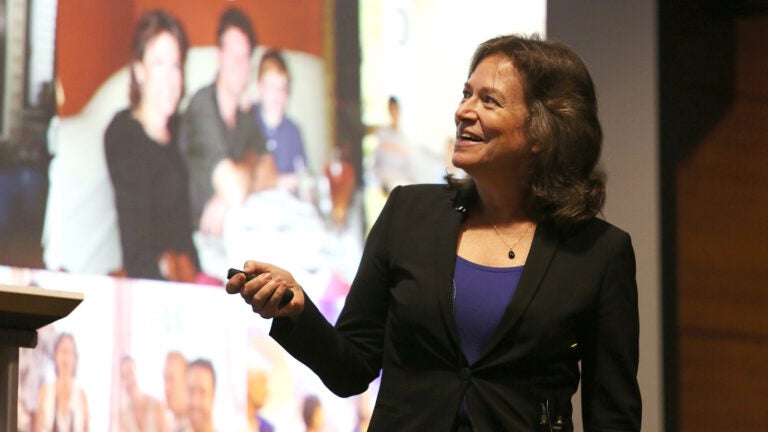
Why L.A. is the best location for harnessing university collaboration to save the planet
Many of society’s biggest challenges — pollution, homelessness, global warming, economic disparity — loom as large in Los Angeles as anywhere in the nation or the world.
Their enormity in L.A. also makes the region the best stage on which to show the world how to solve them. So says Emily Carter, UCLA’s executive vice chancellor and provost, in a pitch to increase collaboration among local university powerhouses.
“The reason I’m back in Southern California and the reason that I decided to take this job is because I think that places like UCLA and USC have a tremendous opportunity to have an outsized impact on the future of cities,” said Carter at the inaugural USC Women in Science and Engineering (WiSE) Presidential Distinguished Lecture on Monday. Carter assumed her position at UCLA in September, about the time of Carol L. Folt’s inauguration as USC’s first woman president.
Carter said saving the world and its cities will require much more than scientific breakthroughs alone. “It will involve everything from sociology to public health to engineering to the arts and beyond to see whether or not we can transform Los Angeles together, in a way that shows the rest of the world how to do that,” she said.
That creative partnership will spawn the social and technological tools (such as fuel cells, photovoltaics, fusion energy and biofuels) needed to improve sustainability, resilience and livability locally and on a global scale, she said.
Carter added that Earth’s long-term viability requires a “virtuous cycle” approach. “We have now reached a point where it’s not enough to be producing fuels and electricity sustainably, we have to actually get the carbon dioxide out of the atmosphere.”
As a researcher, Carter develops and applies quantum mechanics-based computer simulation tools to enable discovery and design of molecules and materials for sustainable energy, including converting sunlight to electricity. Her previous position at Princeton University was dean of engineering and applied science.
Folt introduced Carter and congratulated WiSE on its 20th anniversary, noting that in 2000, USC counted 15 female faculty members spanning science departments within the USC Dornsife College of Letters, Arts and Sciences and USC Viterbi School of Engineering.
“That is not that long ago,” Folt said. “And things have really changed. The need for WiSE was very clear. Today, there are 68 women faculty in WiSE, and we are still counting.”
The two leaders share backgrounds in university administration and as researchers in science, technology, engineering and math (STEM) fields. Both have described a wholistic leadership philosophy that embraces sustainability, improved access to higher education within their campuses and the need for universities to work with diverse stakeholders in solving major societal problems.
Both completed degree programs at the University of California and launched their academic careers during the 1980s, when men vastly outnumbered women in their laboratories.
Carter, a distinguished professor of chemical and biomolecular engineering, began her independent academic career at UCLA. Folt, an aquatic biologist, built a highly successful research lab at Dartmouth College before assuming top leadership positions there and at the University of North Carolina at Chapel Hill.
Despite daunting environmental challenges that lie ahead, Carter said she remains optimistic about the planet’s ability to survive and flourish because its youth will demand it.
“I’m hopeful by the activism of the younger generation — you’re not going to let go of these issues.”